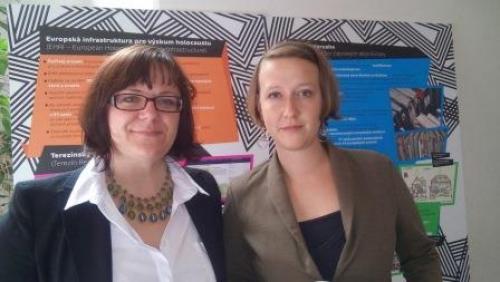EHRI as a special guest on important meeting for Czech Digital Humanities

A first Workshop on Digital Humanities in Czech Republic took place on 24 September 2015 in Prague. Organized by the LINDAT/CLARIN Center, Faculty of Mathematics and Physics, Charles University in Prague and under the auspices of the Ministry of Education, Youth and Sport of the Czech Republic. The event was coordinated in cooperation with the Jewish Museum in Prague and the Institute of Sociology of the Czech Academy of Sciences. With 65 officially registered guests, the workshop was very well attended by various stakeholders in the field. The workshop was opened by professor Eva Hajičová and an opening speech was held by Lukáš Levák, Director Department of Research and Development, Ministry of Education, Youth and Sports.
Presentations
The first four presentations introduced three transnational digital humanities infrastructures and the UK Data Archive. Steven Krauwer from CLARIN presented “What is easy and what is difficult in a digital humanities infrastructure? The CLARIN case”, followed by Carlotta Greci from the UK Data Archive on “Better Knowledge – Better Society. Introducing the Administrative Data Research Network”. “DARIAH in motion – the role of standards” was the focus of the presentation by Laurent Romary and Veerle Vanden Daelen introduced the European Holocaust Research Infrastructure (EHRI).
Poster sessions
The EHRI project was also presented in Czech by Magdalena Sedlická during the poster-sessions over lunch-time in which 19 projects from very different backgrounds (law, history, literature, text analysis, archaeology, etc.) active in Czech Republic were presented. The posters were a nice illustration of how much is going on within digital humanities in Czech Republic and had been framed before its start by the presentations of Jindřich Krejčí and Jan Hajič on the Czech digital humanities infrastructures in the domain of social sciences and humanities within the EU Framework (LINDAT/CLARIN, CSDA & CESSDA).
Panel discussions
The afternoon sessions included two panel discussions. The first posted the question “What can infrastructures offer for social sciences and humanities?”, the second “What do we (users) expect from infrastructures?”.
Challenges
Among other things, the importance of language, safe data (respect for data protection as well as opening up data for research purposes), and the use of standards and unique identifiers were stressed. Restrictions on sharing data, uneven coverage and non-standardized or poor quality metadata cause serious challenges for sharing and interoperability of systems.
Sub-division
The digital humanities should not be seen as a sub-division in humanities, but rather as a method to bring new tools for research in humanities in general which should be used when beneficial to answer a research question. In order for the new methodologies to develop, the field of digital humanities requires stable infrastructures which engage with a broad set of users.
Investing
Hence, the importance that humanities in general should invest in the skills needed. Striving towards more stable infrastructures, more engagement with the data-providers and investing in education in digital tools for researchers are goals we all support.
Photo: Magdalena Sedlická (right) presenting the EHRI Terezín Research Guide and Jarka Vitamvásová, presenting the Yerusha project, an initiative of the Rothschild Foundation (Hanadiv) to virtually unite Jewish documentary heritage from across Europe.
